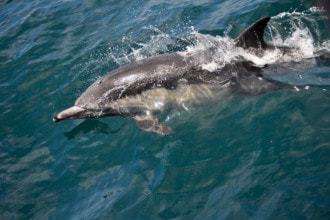
Dear EarthTalk: Why is underwater noise pollution such a big deal and what are we doing to prevent it? — Phil Ziegler, New York, NY
For us land-dwellers, underwater noise rarely reaches our ears. However, marine organisms can be very sensitive to undersea sounds, particularly unnatural noise. Human activity—from explosives to underwater construction to ship traffic to oceanographic research—creates intense noise that threatens the health of ocean wildlife. Direct effects include hearing loss, habitat displacement, and even brain hemorrhages. The noise impedes the senses that enable many marine species to coordinate their movements and find food, and can also interfere with breeding cycles and migration patterns. This cacophony of underwater noise pollution puts additional stresses on marine ecosystems already on the ropes due to overfishing, pollution and myriad other human threats.
Of particular concern lately to environmentalists is underwater noise pollution from seismic testing, where resource extraction industries use air guns to map the seafloor to look for potential oil and gas reservoirs.
“From the water’s surface, the gun generates a blast of sound that penetrates the ocean floor then bounces back up to a receiver, relaying data about the layers of sediment, rocks, and potential fuel deposits below,” reports the Pew Charitable Trusts. “There is concern that the intensity of seismic sounds and their large spatial coverage may lead to injury, disturbance or displacement of marine animals or a masking of their communication.”
While the United Nations (UN) Convention on the Law of the Sea forbids pollution that can damage marine wildlife, a lack of enforcement abilities means corporations and the military can continue to carry out many noisy undersea operations. The non-profit Ocean Mammal Institute would like the UN to endorse a “precautionary approach” limiting all sources of intense underwater anthropogenic sound and requiring individual nations to follow suit accordingly.
“The precautionary principle should be applied publicly and transparently to noise generated for military, commercial and scientific purposes,” reports OMI. “In many cases, there are alternatives and realistic mitigation scenarios for reducing and eliminating very loud human-generated noise from the marine environment, including employing improved passive sonar devices, using reduced noise energy, mechanical and operational designs that minimize noise, alternative energy sources, etc.”
Given the Convention on the Law of the Sea’s lack of “teeth” on monitoring and enforcement on the issue, the United States has started taking matters into its own hands to address underwater noise pollution in its own territorial waters and beyond. The Obama administration recently called for more scientific research to fully understand the ecological impact of underwater noise, and directed the National Oceanic and Atmospheric Administration (NOAA) to step up efforts to track and monitor volume levels below the surface. NOAA is also working on tools that the public, corporations and military can use to assess and help mitigate noise-making activities, and has initiated a campaign to raise public awareness on the issue.
While ocean wildlife activists say much more needs to be done to start solving this insidious problem, at least the U.S. is taking steps in the right direction even if the rest of the world continues to ignore the noisy threats lurking below the depths.
CONTACTS: Ocean Mammal Institute, www.oceanmammalinst.org; Pew Charitable Trusts, www.pewtrusts.org.
EarthTalk® is produced by Roddy Scheer & Doug Moss and is a registered trademark of the nonprofit Earth Action Network. To donate, visit www.earthtalk.org. Send questions to: question@earthtalk.org.

